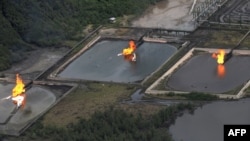For the second time this year, Royal Dutch Shell has shut down a major oil pipeline in southern Nigeria to repair damage caused by theft.
Shell says it shut down its Nembe Creek Trunkline on Monday to remove illegal oil taps and investigate suspected theft-related leaks.
The shutdown will halt production of about 150,000 barrels of oil a day.
As a result, Shell has declared a "force majeure" on its Bonny Crude Light exports, meaning that it is unable to meet the contracted demand.
Shell Nigeria country director Mutiu Sunmonu said the 97-kilometer pipeline has been targeted by crude oil thieves repeatedly since being installed in 2010.
Sunmonu says in a statement that "crude theft continues to affect people, the environment and the economy" and has called for "urgent action" to tackle the problem.
Nigerian activists have accused Shell of allowing massive pollution in the oil-producing Niger Delta and being complicit in human rights abuses by the Nigerian government.
Activists have tried to press their case in the U.S. legal system. On Wednesday, however, the U.S. Supreme Court ruled federal courts do not have jurisdiction to hear lawsuits against foreign companies accused of rights abuses abroad.
Shell says it shut down its Nembe Creek Trunkline on Monday to remove illegal oil taps and investigate suspected theft-related leaks.
The shutdown will halt production of about 150,000 barrels of oil a day.
As a result, Shell has declared a "force majeure" on its Bonny Crude Light exports, meaning that it is unable to meet the contracted demand.
Shell Nigeria country director Mutiu Sunmonu said the 97-kilometer pipeline has been targeted by crude oil thieves repeatedly since being installed in 2010.
Sunmonu says in a statement that "crude theft continues to affect people, the environment and the economy" and has called for "urgent action" to tackle the problem.
Nigerian activists have accused Shell of allowing massive pollution in the oil-producing Niger Delta and being complicit in human rights abuses by the Nigerian government.
Activists have tried to press their case in the U.S. legal system. On Wednesday, however, the U.S. Supreme Court ruled federal courts do not have jurisdiction to hear lawsuits against foreign companies accused of rights abuses abroad.





